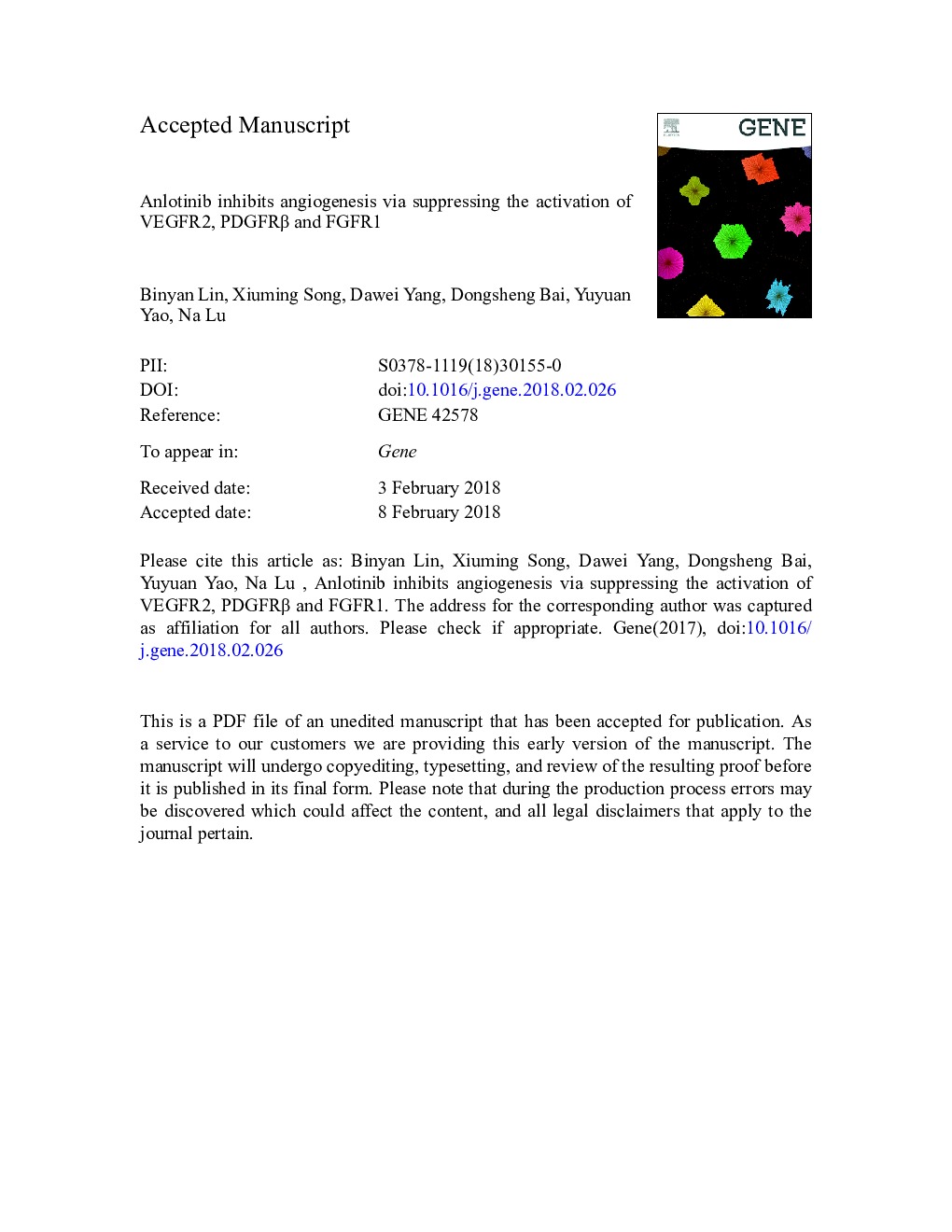| کد مقاله | کد نشریه | سال انتشار | مقاله انگلیسی | نسخه تمام متن |
|---|---|---|---|---|
| 8645362 | 1569782 | 2018 | 33 صفحه PDF | دانلود رایگان |
عنوان انگلیسی مقاله ISI
Anlotinib inhibits angiogenesis via suppressing the activation of VEGFR2, PDGFRβ and FGFR1
دانلود مقاله + سفارش ترجمه
دانلود مقاله ISI انگلیسی
رایگان برای ایرانیان
کلمات کلیدی
FGF receptor 1PDGF receptor βPDGF-BBTKIFGFR1PDGFRβFGF-2VEGFR2BSA - BSADMSO - DMSObovine serum albumin - آلبومین سرم گاوAngiogenesis - آنژیوژنزTumor - تومورDimethylsulfoxide - دیمتیل سولفواکسیدCAM - ساخت به کمک کامپیوترplatelet-derived growth factor-BB - عامل رشد پلاکتی-BBVascular endothelial growth factor - فاکتور رشد اندوتلیال عروقیVascular Endothelial Growth Factor (VEGF) - فاکتور رشد اندوتلیال عروقی (VEGF)Tyrosine kinase inhibitor - مهار کننده تیروزین کینازVEGF receptor 2 - گیرنده VEGF 2
موضوعات مرتبط
علوم زیستی و بیوفناوری
بیوشیمی، ژنتیک و زیست شناسی مولکولی
ژنتیک
پیش نمایش صفحه اول مقاله

چکیده انگلیسی
Tumor cells recruit vascular endothelial cells and circulating endothelial progenitor cells to form new vessels to support their own growth and metastasis. VEGF, PDGF-BB and FGF-2 are three major pro-angiogenic factors and applied to promote angiogenesis. In this research, we demonstrated that anlotinib, a potent multi-tyrosine kinases inhibitor (TKI), showed a significant inhibitory effect on VEGF/PDGF-BB/FGF-2-induced angiogenesis in vitro and in vivo. Wound healing assay, chamber directional migration assay and tube formation assay indicated that anlotinib inhibited VEGF/PDGF-BB/FGF-2-induced cell migration and formation of capillary-like tubes in endothelial cells. Furthermore, anlotinib suppressed blood vessels sprout and microvessel density in rat aortic ring assay and chicken chorioallantoic membrane (CAM) assay. Importantly, according to our study, the anti-angiogenic effect of anlotinib is superior to sunitinib, sorafenib and nintedanib, which are three main anti-angiogenesis drugs in clinic. Mechanistically, anlotinib inhibits the activation of VEGFR2, PDGFRβ and FGFR1 as well their common downstream ERK signaling. Therefore, anlotinib is a potential agent to inhibit angiogenesis and be applied to tumor therapy.
ناشر
Database: Elsevier - ScienceDirect (ساینس دایرکت)
Journal: Gene - Volume 654, 15 May 2018, Pages 77-86
Journal: Gene - Volume 654, 15 May 2018, Pages 77-86
نویسندگان
Binyan Lin, Xiuming Song, Dawei Yang, Dongsheng Bai, Yuyuan Yao, Na Lu,